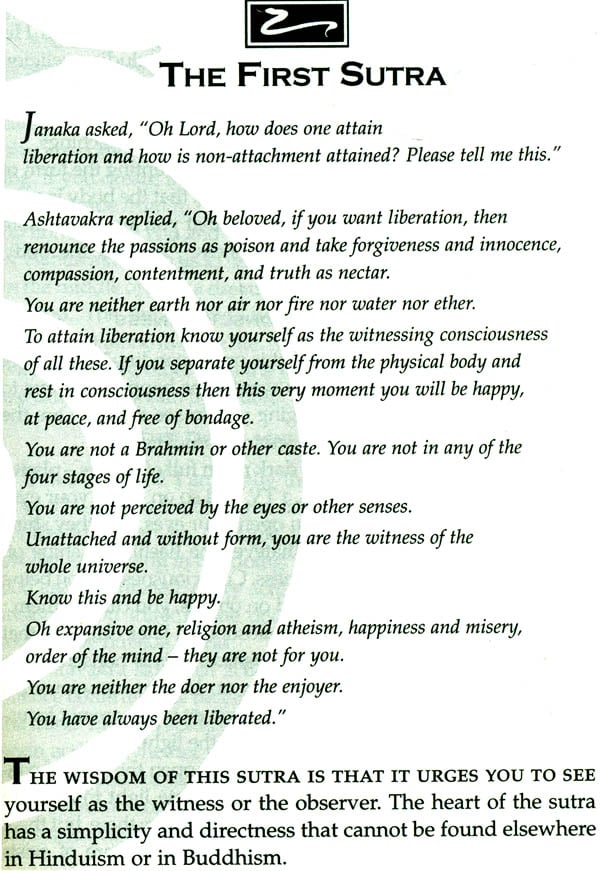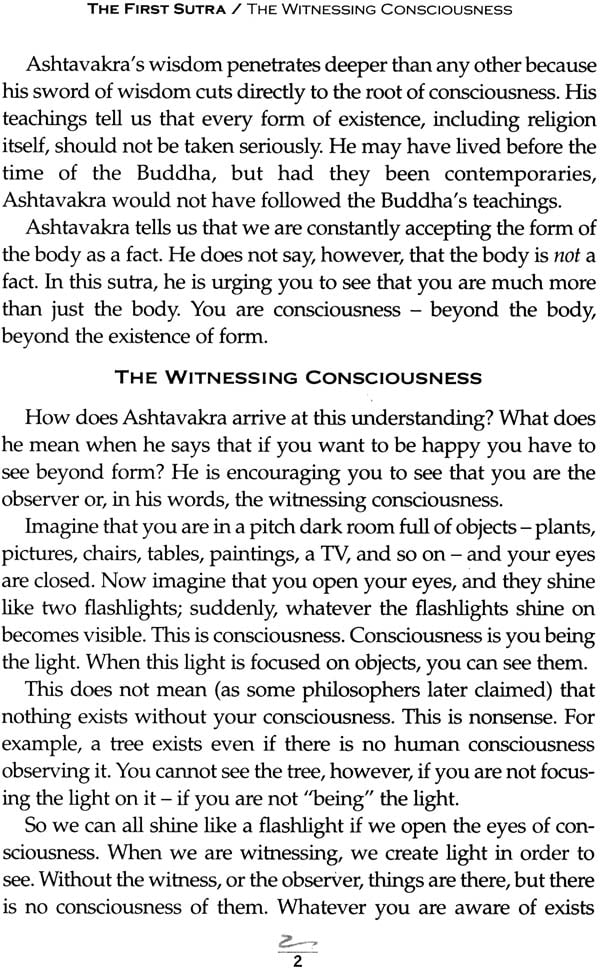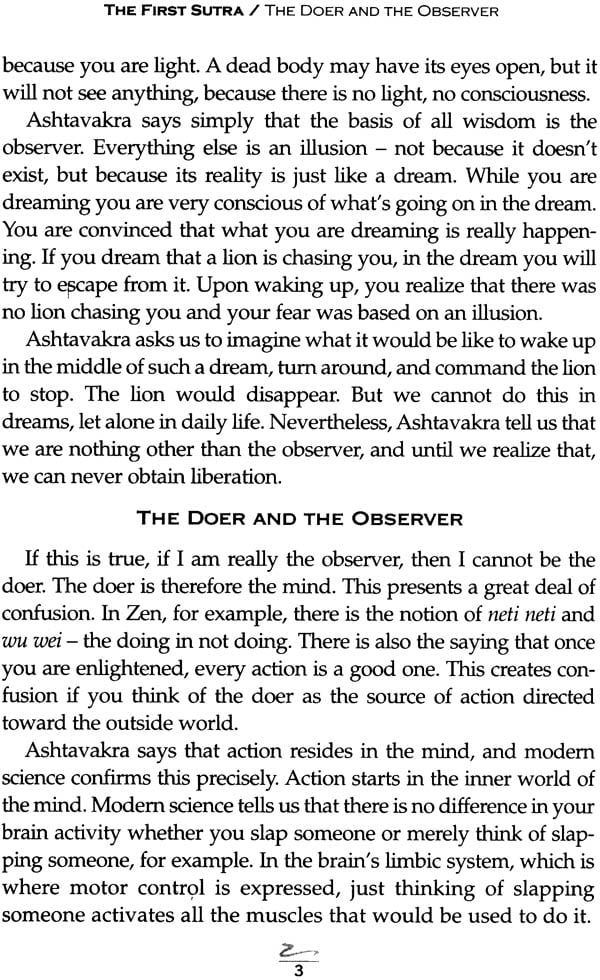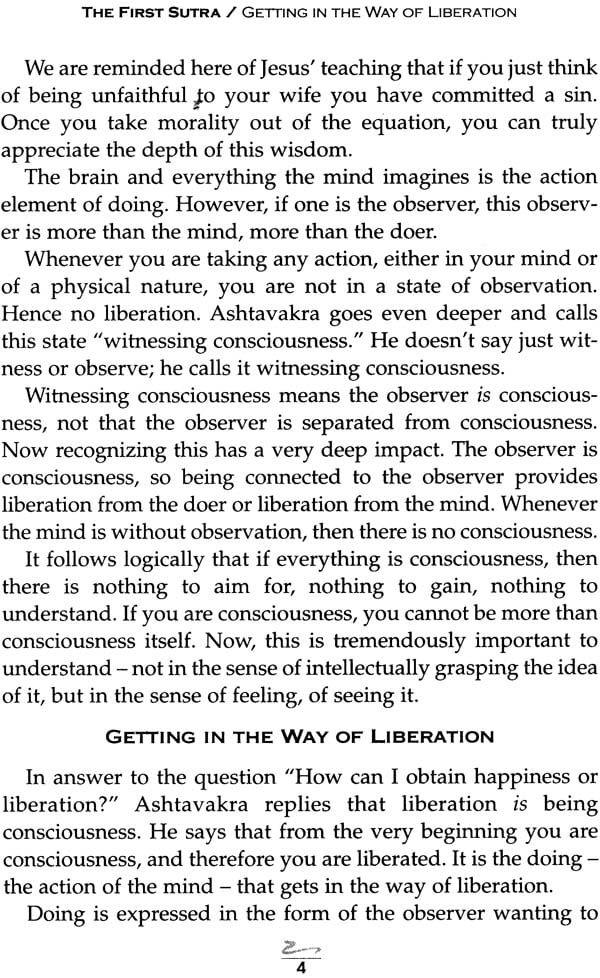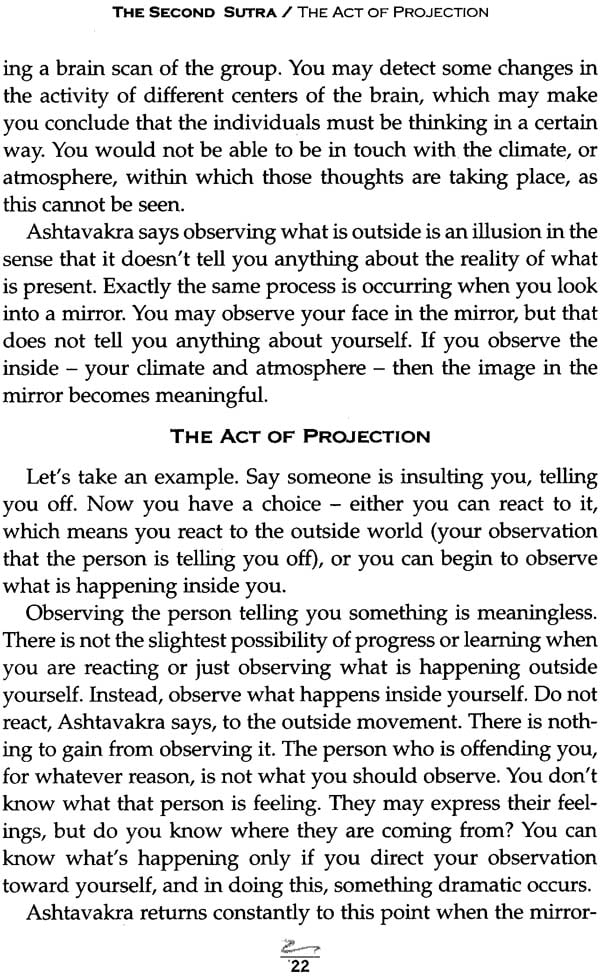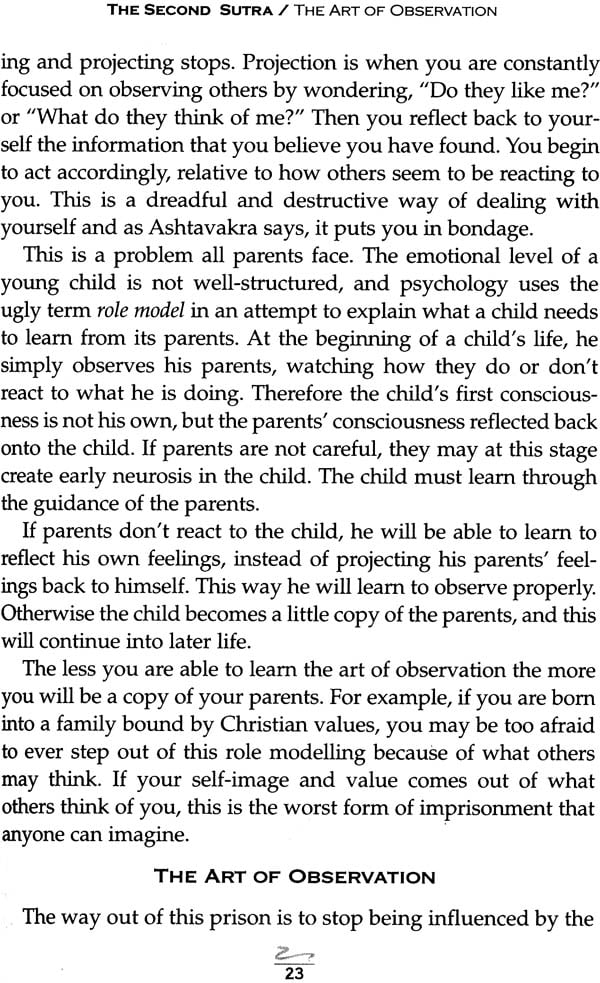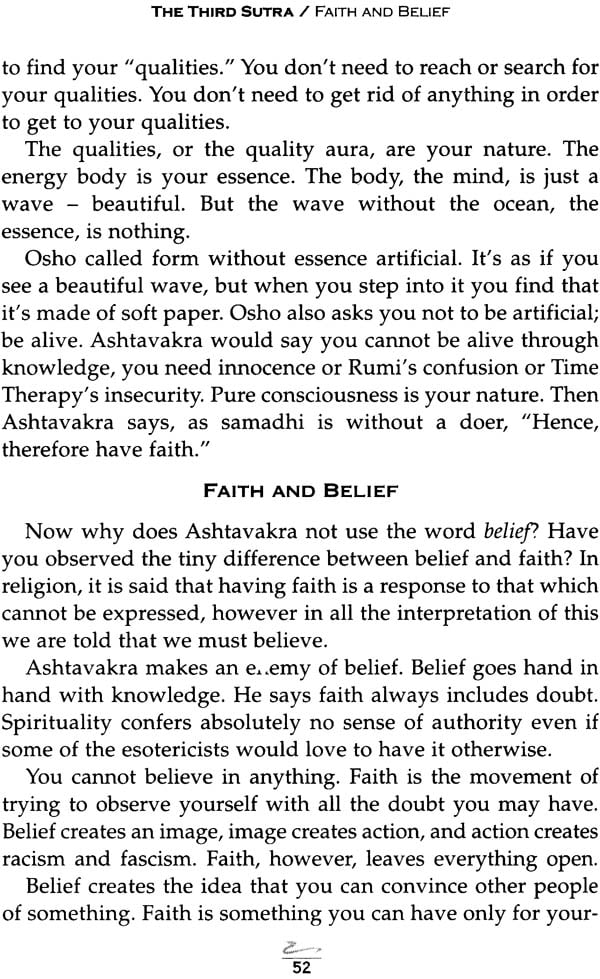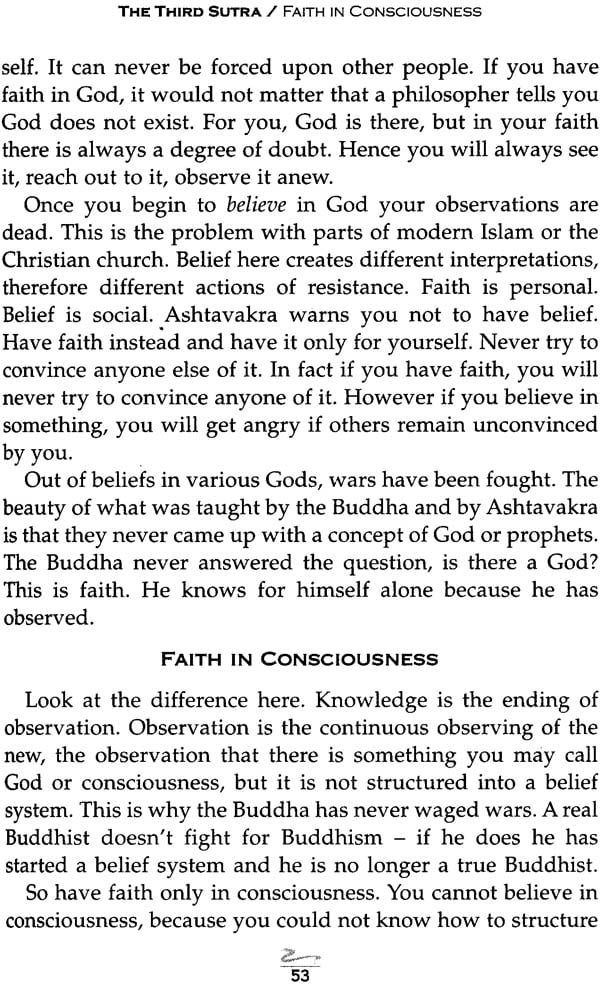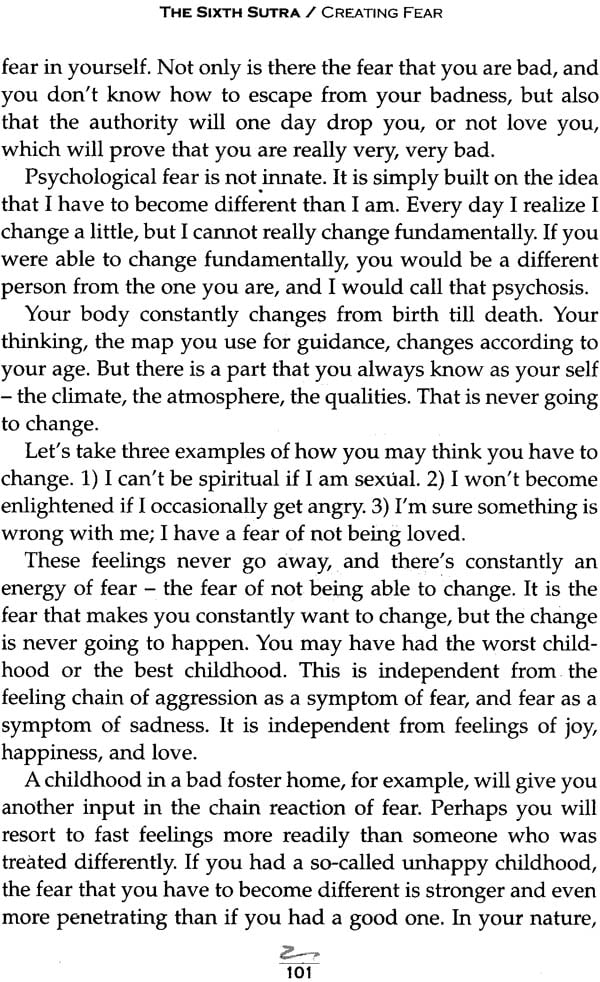
Bitten by the Black Snake: The Ancient Wisdom of Ashtavakra the Great Indian Sage
Book Specification
| Item Code: | IDL204 |
| Author: | Manuel Schoch |
| Publisher: | Wisdom Tree Publications |
| Language: | English |
| Edition: | 2008 |
| ISBN: | 9788183281294 |
| Pages: | 114 |
| Cover: | Paperback |
| Other Details | 8.5" X 5.5" |
| Weight | 160 gm |
Book Description
Foreword
A Sutra is Literally a Thread. Sutras Are Bare Threads of exposition unadorned by excesses, because of course they were delivered at a time before books existed and so had to be tersely expressed.
This book is unique in that it relates Ashtavakra’s sutras to a modern context. Although Ashtavkra predates Jesus Christ, Mohammed, and perhaps Buddha, his wisdom chimes with that of contemporary masters.
Little is known about the author of these sutras, which are thought to originate from the 4th or 5th century BC. It is said that Ashtavakra was the son of a lesser disciple of the great sage Uddalaka, married to Uddalaka’s daughter. The unborn child, who already had mastered the Vedas, kept twisting and turning within the womb, unable to bear his father’s mistakes in recitation, and was therefore born with eight deformations. Hence he was called Ashta (eight) Vakra (bends). Ashtavakra went on to become a great sage himself, and had the honor of having the king as one of his students.
These sutras are meant to reflect a dialogue between Ashtavakra and King Janaka on the nature of the soul, reality, and bondage and the means to liberation. Ancient teachers would repeat a sutra by heart and then go on to amplify it for the benefit of their pupils. Here, Manuel Schoch is amplifying Ashtavakra’s sutras, and helping the reader get into the very consciousness of Ashtavakra.
Manuel’s reflections put us at the crossroads between psychology and spirituality – that point of combustion that can deliver us to another dimension of higher spiritual integration, beyond the ego. Like Ashtavakra’s, Manuel’s insights are direct and penetrating, leaving little leeway for misinterpretation. In reading these words it becomes apparent that both Manuel and Ashtavakra are masters in dealing with the mind.
In Manuel’s discussion of the sutras, the age old issues of fear, desire, feelings, and stillness are grappled with skillfully. Manuel crisscrosses his deep exposition with references to his own Time Therapy and to other major philosophical systems.
It is refreshing to hear Manuel reinforce Ashtavakra’s observation that being at peace with everything is key to attaining enlightenment and how this doesn’t involve changing a single thing about oneself. Read on and be enlightened.
Back of the Book
The Ashtavakra Gita is an Ancient Indian text from the classic Vedanta period. It has been appreciated and quoted by many renowned spiritual teachers, such as Ramakrishna, Vivekananda, Ramana Maharshi, Radhakrishnan, and Osho, as it presents the traditional teachings of Advaita with a clarity and power very rarely matched. It has been called “a quantum leap into the absolute.”
Osho said of it, “Man has many scriptures, but none are comparable to the Gita of Ashtavakra. Before it the Vedas pale, the Upanishads are a mere whisper. Even the Bhagavad Gita does not have the majesty found in the Ashtavakra Gita-it is simply unparalleled.”
In interpreting the timeless wisdom of this text for modern sensibilities, Manuel Schoch shows us very practically, step by step, how one can simply observe, instead of engaging in the constant reaction and struggle created by the black snake of the ego. Instead of identifying with one’s body, thoughts, feelings, habits, and experience, one can be connected to the everlasting consciousness that manifests these. In his remarkably clear and simple way, Manuel describes how one can rest in the stillness from which emerge the qualities of life and love, peace and compassion, bliss and enlightenment.
Swiss mystic and therapist Manuel Schoch is the author of Healing with Qualities. He developed Time Therapy, about which he gives international talks, workshops, and training programs. He is the director of the Tune-In Centre for Time Therapy based in Zurich, London, and Athens, which he founded in 1984.
| Foreword | ix |
| The First Sutra | 1 |
| The Witnessing Consciousness | 2 |
| The Doer And The Observer | 3 |
| Getting In the Way of Liberation | 4 |
| Games of the Mind | 5 |
| Desire For Enlightenment | 6 |
| A State of Happiness | 8 |
| Behind The Mask | 9 |
| Free Will | 11 |
| Modern Meditation | 12 |
| The Space Of Stillness | 13 |
| Perceiving with the Senses | 14 |
| Light VS. Religion | 15 |
| Consciousness and Heart Energy | 16 |
| Stillness of the Heart | 16 |
| The Second Sutra | 20 |
| Looking Out, Looking In | 21 |
| The Act of Projection | 22 |
| The Art of Observation | 23 |
| The Space of No Reaction | 24 |
| Awareness and Observation | 25 |
| No Separation | 26 |
| Observing the Whole | 28 |
| The Freedom of One Mind | 29 |
| The Power of Rebelling | 30 |
| As You Think, So You Are | 31 |
| Reality and Projection | 33 |
| The Serpent of Ego | 35 |
| Thought Processes | 36 |
| The Process of Doing | 38 |
| Creating Desire | 39 |
| Waking Up | 39 |
| Observing Desire | 41 |
| The Third Sutra | 43 |
| Being The Observer | 44 |
| The End of Separation | 45 |
| Dondage and Innocence | 46 |
| Confusion Creates Observation | 48 |
| The Bondage Of Motivation | 49 |
| Nothing To Do | 51 |
| Faith and Belief | 52 |
| Faith In Consciousness | 53 |
| Form and Stillness | 54 |
| Stillness of the Heart | 56 |
| Being With What Is | 57 |
| Reflecting Consciousness | 58 |
| The Stillness of Emptiness | 59 |
| The Fourth Sutra | 61 |
| The Spiritual Ego | 62 |
| Bypassing The Ego | 64 |
| Becoming Still | 65 |
| The Structure of Feelings | 66 |
| A Third State | 67 |
| Lost Connections | 69 |
| Beyond The Ego | 70 |
| Knowing There is Nothings | 71 |
| Sneaking Around the Ego | 73 |
| Feeling The Climate | 74 |
| Dropping Into Stillness | 75 |
| The Fifth Sutra | 76 |
| Creating Illusion | 77 |
| Living In the Heart | 78 |
| Beyond Desire | 79 |
| Fear And Desire | 81 |
| A Question of Motivation | 82 |
| Forgetting The Self | 83 |
| Effortless Awareness | 84 |
| Nothing Special | 86 |
| Seeing The Whole | 87 |
| Attachment to Detaching | 89 |
| Desiring Liberation | 91 |
| Working With the Heart | 93 |
| The Sixth Sutra | 95 |
| Happiness Itself | 97 |
| Creating Fear | 98 |
| The Ego Is Like The Apple | 103 |
| Transformation Through Observation | 105 |
| Off The Map | 106 |
| The Identification Game | 110 |
| Can The Climate Change? | 111 |
| About The Author | 115 |
